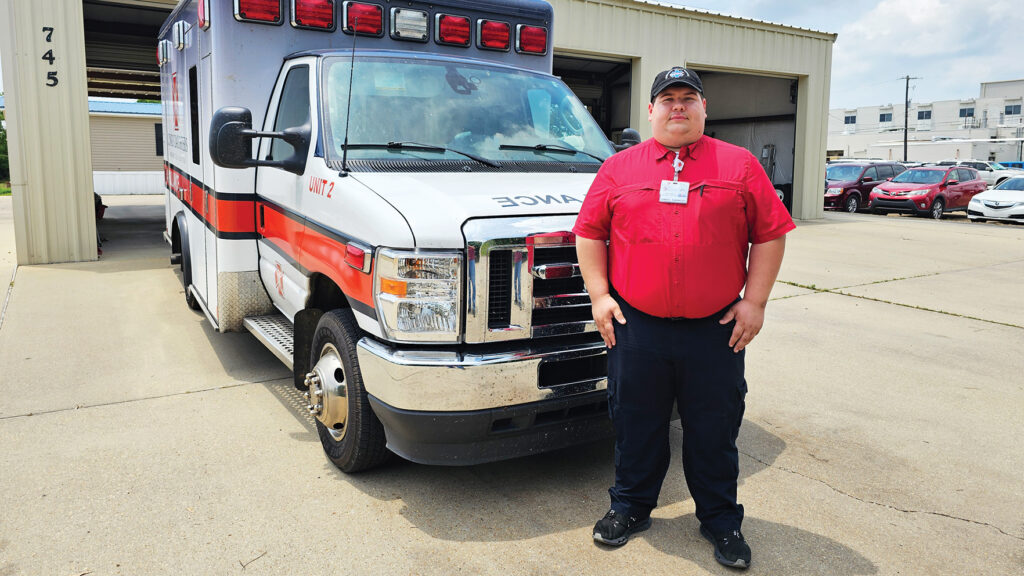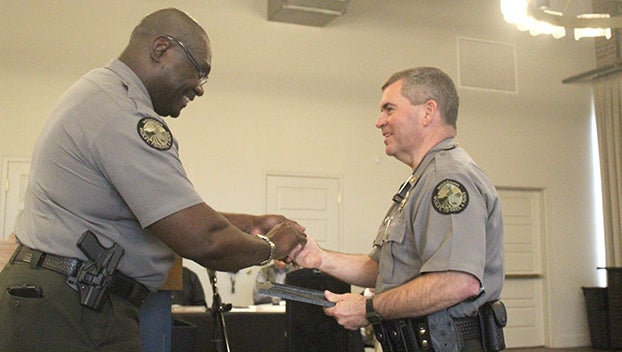A solid connection: Young paramedic works to make a difference
Published 1:13 pm Saturday, June 1, 2024

- PHOTO BY BRETT CAMPBELL Paramedic Samuel Edwards
Samuel Edwards is what you might call a newbie in the paramedic field. The Loyd Star native has been a paramedic for just more than six months at King’s Daughters Medical Center in Brookhaven.
But prior to that, he was an Emergency Medical Technician at KDMC. Before that, he worked three years as a 9-1-1 dispatcher at the Lincoln County Sheriff’s Office. And he’s also a deputy coroner for Lincoln County. So emergency services is in the blood of this 24-year-old.
When he graduated Loyd Star High School, he studied accounting at Southwest Mississippi Community College in Summit. When he finished, he decided he needed a better-paying job. He knew people who worked in dispatch, so he applied and started working for Sheriff Steve Rushing in November 2020.
“Working on that side of things I got to pretty much experience all of the emergency services we have,” said Edwards.
“I got interested in the EMT side, so I went to EMT class at Co-Lin in 2022 and really enjoyed it — something I didn’t think I would ever do,” he said. “But once I started, it felt right, like it was where God wanted me to be.”
As soon as he completed his EMT training, he went directly into paramedic school, and he’s now finishing a bachelor’s degree in paramedicine — which covers everything from EMS administration and management to critical care paramedic services.
Burnout is a problem in the paramedic field, but Edwards doesn’t think he’ll have that problem personally.
“The average burnout for new paramedics is 3 to 5 years. That’s a national statistic. It’s burn-out just from the amount of work in the field it requires, and most places are short-staffed,” he said. “We are blessed right now to be fully-staffed. You also see an increase in call volume, which leads to more work.”
“But it is still new to me. I still enjoy it,” said Edwards. “My first partner, Mr. Charles Schaeffer — a long-time paramedic — is somebody who still loves it. He radiates that to me. We don’t always solve all the problems, but sometimes we do. To be able to help your patients, to calm them, goes just as far as being able to medically help your patients.”
Edwards enjoys going to work. He works with great people and for a great company, he said, with good people from the top down.
The outcome to every call is not what responders want, but you do the best you can, he said.
“Not everybody lives, you know,” said Edwards, telling of two calls he had in the past year where the parents of some of his high school friends coded — their hearts stopped during calls to which he responded.
“Neither one of them made it, sadly. But, you know, that’s when it kind of brought it home to me realizing that I’m working in a community I grew up in. You’re going to work on people you know, and it’s going to take an emotional toll on you. You have to put that aside while you’re there, while you working on that,” he said. “What I can get out of it is that I gave them every-thing I had. I can still look at those people I graduated with, my friends, and know that I did everything I could for their loved ones, their parents.”
Providing emergency medical services for your hometown community makes a real difference, Edwards said.
“You have more of that solid connection. You trust that person to do what they do.”





